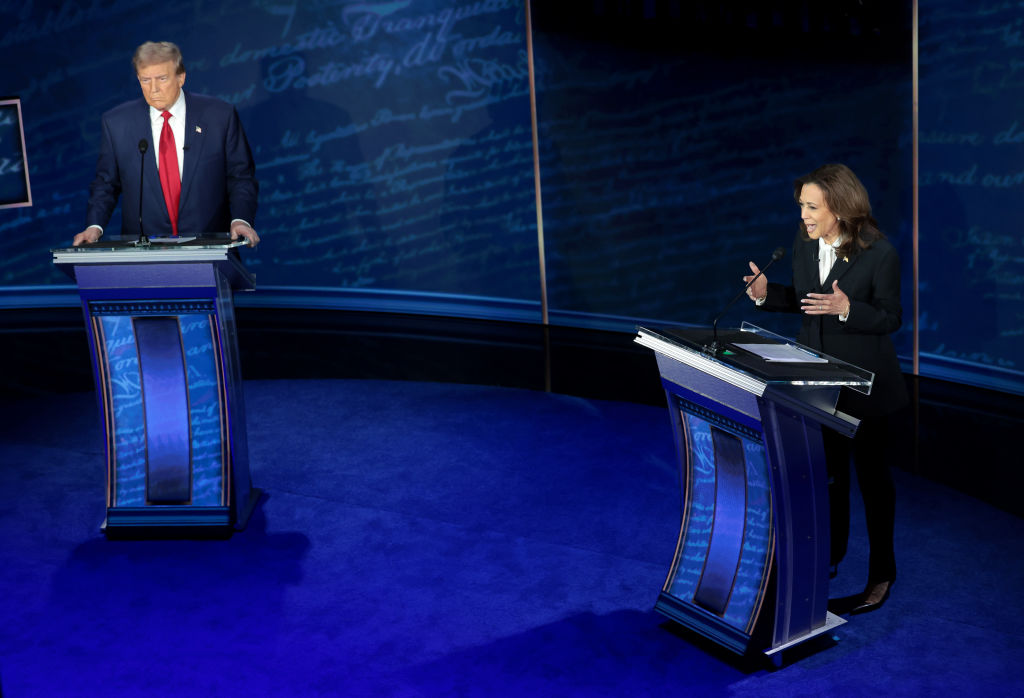Washington, DC
Not since South Park Elementary’s election campaign between a Giant Douche and a Turd Sandwich has an election bedeviled me as much as this one. On the one hand, the choice is disarmingly simple. One of the candidates is obviously mentally unhinged, delusional, malignant and contemptuous of the rule of law. One of the candidates hasn’t just broken norms. He has broken the norm, the indispensable norm for the continuation of the republic: accepting the results of an election. This is the third time Donald Trump has told us in advance he won’t do that if he doesn’t win. And the second time, he incited a mob to disrupt the peaceful transfer of power. One of the candidates is also pledging a wave of protectionism not seen since the 1930s, the mass deportation of more than 11 million people, the judicial persecution of his political enemies and an enthusiasm for the latest expansion of the Russian empire. The other is merely old-school Democratic cringe.
So why on earth is it so nail-bitingly close? And why did I find myself writing an endorsement of Kamala Harris last week only to be immediately beset by a case of sudden-onset nausea? Yes, it’s the platitudes, the elite-speak, the fawning crowds and the irritating eruptions of fake “joy” that put me off. But is there a clear reason to vote for Harris — or does this feel like Hillary Clinton in 2016 all over again? She was never supposed to be the candidate, of course, and if Joe Biden’s vanity hadn’t got in the way, she would have been winnowed out in a primary long ago. Her weaknesses are hard to hide. She has never campaigned by herself against a serious Republican opponent. Despite a good acceptance speech and decent debate, she hasn’t obviously seized a lead. She’s ahead (at the moment) but it feels extremely flimsy.
Yes, Harris has made herself plausible as a possible president, but that’s about it. Abortion — her strongest issue by far — has not dominated the campaign, while immigration — her weakest — is everywhere. Almost all the very little news in the campaign has been driven by Trump, and almost nothing has changed in over a month. Should we assume the polls underestimate Trump as in 2020? Or are they missing the Democrats’ hidden strength, as in 2022? One party seems to have been swallowed by its candidate; the other candidate appears to have been swallowed by her party. It seems to me, as we stagger grimly on, that Trump cannot win but that Harris hasn’t come close to clinching it. And that Americans, by and large, want to keep it that way. Until, of course, they can’t.
What would American politics be like without Trump? On October 1, we found out. It would be an elevated, tough and sometimes supple conversation between a conservative who has learned some things in this century and a liberal who may be a bit wonky, but whose heart is in the right place. The Vance-Walz debate will lead to a big jump in approval for J.D. Vance; and it’s a useful reminder that, beneath the noise and chaos, a saner, calmer America still hangs in there. It may even have a future beyond the orange glow.
Editing a weekly magazine of opinion has always been a bit tricky. I had my shot at the New Republic in its glory days, and lasted the usual amount of time — around five years. For me and other editors, the job of making a magazine fun for its readers eventually meant becoming unpopular with its writers. That The Spectator exists at all as a magazine is the real achievement in the online era. There are almost none left that work as a magazine should: a gathering of familiar voices and moods, distinct in its identity and confident enough to play with it. A magazine’s writers were once easily joined by staples and paper. The web scatters everything. To sustain that distinctness and character in this fast-evaporating media blizzard is remarkable.
Add to that the punishingly brutal economics of online journalism and The Spectator’s resilience is near-unique. My old mag has faded. So have most others. The places where heterodoxy thrives, wit happens and an alchemy somehow emerges as something coherent are rarer than ever. I’m sure many are responsible but I’d be remiss in not tipping the hat to Fraser Nelson in this. He made it look easy. And I for one know how profoundly it isn’t.
Andrew Sullivan runs the Weekly Dish newsletter, website and podcast. This article was originally published in The Spectator’s November 2024 World edition.


























Leave a Reply